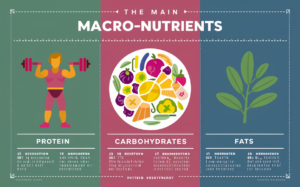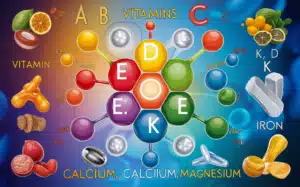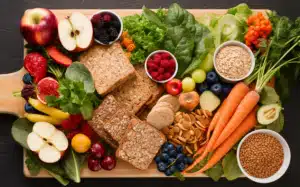You are what you eat – or so the saying goes. While that might be a simplification, the nutrients we consume play a vital role in our energy levels, physical performance, mood, and overall health. In this article, we’ll explore the key nutrients your body needs for optimal health, why they’re essential, and how to ensure you’re getting enough to thrive. Think of it as your guide to creating a balanced, nutritious diet that supports your well-being at every level.
Macronutrients: The Foundation of Your Diet
These are the nutrients we need in the largest amounts:

-
Carbohydrates: The body’s primary fuel source. Choose complex carbs like whole grains, fruits, and vegetables for sustained energy.
-
Protein: Crucial for building and repairing tissues, creating enzymes and hormones, and supporting immune function. Include sources like lean meats, poultry, fish, beans, lentils, and tofu.
-
Fats: Don’t fear fats! They provide energy, help absorb vitamins, and support brain function. Prioritize unsaturated fats from sources like avocados, nuts, seeds, and olive oil.
Micronutrients: Vitamins and Minerals
These nutrients are needed in smaller amounts but play massive roles:

-
Vitamins: Organic compounds essential for various bodily functions.
- Vitamin A: Supports vision, immune function, and cell growth.
- Vitamin C: A powerful antioxidant that boosts immunity and collagen production.
- Vitamin D: Essential for calcium absorption and bone health.
- B Vitamins: Play a crucial role in energy metabolism and nervous system function.
- Vitamin E: Another potent antioxidant that protects cells from damage.
- Vitamin K: Important for blood clotting and bone health.
-
Minerals: Inorganic elements vital for bodily processes.
- Calcium: Builds strong bones and teeth, aids muscle function, and nerve transmission.
- Iron: Helps transport oxygen throughout the body.
- Magnesium: Supports muscle and nerve function, regulates blood sugar, and promotes bone health.
- Potassium: Crucial for regulating fluid balance, blood pressure, and muscle contractions.
- Zinc: Supports immune function, wound healing, and DNA synthesis.
Water: The Essential Nutrient
Water is often overlooked, but it’s the most crucial nutrient for survival. It helps regulate body temperature, transports nutrients, lubricates joints, and flushes waste. Aim to drink plenty of water throughout the day, especially if you’re active.
Fiber: Your Gut’s Best Friend

Fiber, often overlooked, is a type of carbohydrate that your body can’t digest. It passes through your digestive system mostly intact, providing a wealth of benefits along the way. Think of it as the “scrub brush” for your gut, promoting regularity, satiety, and even contributing to heart health. Fiber is a type of carbohydrate that your body can’t digest. It aids digestion, promotes regular bowel movements, helps regulate blood sugar, and can lower cholesterol. Find it in whole grains, legumes, fruits, and vegetables.
Other Essential Nutrients
- Choline: Crucial for brain health and development. Found in eggs, liver, and fish.
- Omega-3 Fatty Acids: Promote heart health, reduce inflammation, and support cognitive function. Found in fatty fish like salmon, flaxseeds, and walnuts.
Getting Enough Nutrients: Tips for a Balanced Diet
- Eat a Variety of Foods: No single food group can provide all the nutrients you need. Aim for diversity.
- Focus on Whole Foods: Choose minimally processed foods closest to their natural state.
- Read Labels: Be mindful of hidden sugars, unhealthy fats, and sodium in processed foods.
- Consider Supplements: If you have specific deficiencies or dietary restrictions, talk to your doctor about supplements.
- Cook More Meals at Home: You have more control over ingredients and cooking methods when you cook at home.
- Consult a Registered Dietitian: If you have specific needs or concerns, a dietitian can personalize a nutrition plan for you.
FAQs
Q1. Do I need to take supplements to get enough nutrients?
A healthy, balanced diet should provide most people with essential nutrients. However, some individuals may need supplements due to deficiencies, dietary restrictions, or certain medical conditions. Consult with your doctor to determine your individual needs.
Q2. Can I get all the nutrients I need from a plant-based diet?
Yes, a well-planned vegan or vegetarian diet can provide all the essential nutrients. Pay attention to ensure you’re getting enough protein, iron, calcium, and vitamin B12, which can be less abundant in plant-based foods.
Q3. How much water should I drink daily?
There’s no one-size-fits-all answer, but a general guideline is to aim for about eight 8-ounce glasses of water per day. Your individual needs may vary based on activity level, climate, and overall health.
Q4. What are some signs that I might have a nutrient deficiency?
Fatigue, hair loss, brittle nails, skin issues, and changes in mood or cognitive function can be signs of nutrient deficiencies. Consult with your doctor for a proper diagnosis and treatment.
Q5. Should I track my nutrient intake?
Tracking your nutrient intake can be helpful for identifying potential areas for improvement. There are many apps and online tools available to help you with this. However, it’s important to focus on overall healthy eating patterns rather than obsessing over individual numbers.
By prioritizing a diverse, balanced diet, you can ensure that your body gets the essential nutrients it needs to thrive. Remember, it’s not about perfection but rather making informed choices that support your overall well-being. Here’s to nourishing your body from the inside out!
